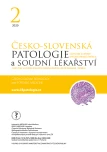-
Medical journals
- Career
Deaths in traffic accidents associated with THC abuse
Authors: Másilková Monika 1; Kolčava Radek 2; Bosák Miroslav 3; Otásková Tamáš Jitka 4
Authors‘ workplace: Jihočeská univerzita v Českých Budějovicích, Zdravotně sociální fakulta, Ústav radiologie, toxikologie a ochrany obyvatelstva, České Budějovice 1; Městský úřad Pelhřimov, Odbor vnitřních věcí, Úsek přestupkové agendy a veřejného pořádku 2; Jihočeská univerzita v Českých Budějovicích, Zdravotně sociální fakulta, Ústav humanitních studií v pomáhajících profesí, České Budějovice 3; Jihočeská univerzita v Českých Budějovicích, Zdravotně sociální fakulta, Ústav ošetřovatelství, porodní asistence a neodkladné péče, České Budějovice 4
Published in: Soud Lék., 65, 2020, No. 2, p. 22-26
Category: Original Article
Overview
From the National Registry of autopsies and toxicology examinations, we selected the deceased for 2015, 2016, 2017 and January 2018 active road accident participants, i.e. pedestrians, cyclists and motor vehicle drivers. From these, we further selected those who were tested for THC presence. Of the 836 deceased active road accident participants, only 251 (i.e. 30%) were tested for cannabinoids, most often passenger car drivers, 46 percent. Of the 251 people tested, THC was demonstrated in 12 (4.8%), most commonly motorcycle drivers (7.8%) and passenger car drivers (3.4%). Of the 12 positive people, 7 were found to have a possible effect of THC ingestion on the road accident, but only one participant was found to have overdosed on THC, and 2 were reported by the dissecting physician to have had no effect on the accident. In the Czech Republic, when driving under the influence of addictive substances, there is no uniform procedure for qualification, whether it is an offence or an offence, and thus in the award of punishment. While somewhere there is an effort to divide this wrongdoing into offences and crimes, elsewhere it practically always only constitutes an offense. This situation seeks to resolve the instruction of the Attorney-at-chief 1 SL 732/2018 of 29 December 4.2019, which, however, arose without any discussion with the professional public, which is heavily criticized especially for the absurly high limits, which in particular in morphine and cocaine are practically unachievable. At the time of this writing, the impact of this guideline on practice is not clear.
Keywords:
THC – traffic accident – National Registry of autopsies and toxicology examinations – effect of THC on drivers – penalties in traffic
Sources
1. Zákon o zdravotních službách a podmínkách jejich poskytování (zákon o zdravotních službách). In: Sbírka zákonů. Česká republika. Tiskárna ministerstva vvnitra, 2011, částka 131, číslo 372, účinnost 1.4.2012.
2. Ústav zdravotnických informací a statistiky ČR. Pitvy a toxikologická vyšetření prováděná na odděleních soudního lékařství 2015, zdravotnická statistika, 2017.
3. Walsh J, de Gier J, Christopherson A, Verstraete A. Drugs and driving. Traffic Inj Prev 2004; 5 : 241-253.
4. Kelly E., Darke S., Ross J. A review of drug use and driving: epidemiology, impairment, risk factors and risk perceptions. Drug Alcohol Rev 2004 ;23 : 319-344.
5. Dussault C, Brault M, Bouchard J, Lemire A. The contribution of alcohol and other drugs among fataly injured drivers in Quebec. Proceedings of the 16th International Conference on Alcohol, Drugs and Traffic Safety 2002; 423-430.
6. Hirt M, Vorel F, a kolektiv. Soudní lékařství. Praha: Grada Publishing, 2016.
7. Úřad vlády České republiky. Národní monitorovací středisko pro drogy a závislosti. Výroční zpráva. 2013.
8. Laberge JC, Ward NJ. Research note: cannabis and driving - research needs and issues for transportation policy. Journal of Drug Issues 2004; 4 : 971-990.
9. Cannabis – A Health Perspective and Research Agenda. Geneva: World Health Organization, Division of Mental Health and Prevention of Substance Abuse, 1997.
10. Mravčík V, Zábranský T, Vorel F. Drogy a dopravní nehody. Čas Lék Čes 2005; 144(8): 550–555.
11. Zákon o provozu na pozemních komunikacích a o změnách některých zákonů. In: Sbírka zákonů. Česká republika. 2010, částka 98, číslo 361, účinnost 1.1.2001.
12. Trestní zákoník. In: Sbírka zákonů. Česká republika. 2009, částka 11, číslo 40, účinnost 1.1.2010.
13. Balíková M. Forenzní a klinická toxikologie: laboratorní toxikologická vyšetření. Druhé, doplněné vydání. Praha: Galén, 2017.
14. Zákon, kterým se mění zákon č. 361/2000 Sb., o provozu na pozemních komunikacích a o změnách některých zákonů (zákon o silničním provozu), ve znění pozdějších předpisů. In: Sbírka zákonů. Česká republika: Tiskárna ministerstva vnitra, 2013, ročník 2013, částka 91, číslo 233. Účinnost 17.8.2013.
15. Nařízení vlády o stanovení jiných návykových látek a jejich limitních hodnot, při jejichž dosažení v krevním vzorku řidiče se řidič považuje za ovlivněného takovou návykovou látkou. In: Sbírka zákonů. Česká republika, 2014, částka 17, číslo 41, účinnost 2.4.2014.
16. Blažejovský M. Drogy v dopravě. Praha: Wolters Kluwer, 2015.
17. Ředitelství služby dopravní policie Policejního prezidia ČR. Nehodovost na pozemních komunikacích v České republice za rok 2017. Praha: Ministerstvo vnitra ČR 2018.
Labels
Anatomical pathology Forensic medical examiner Toxicology
Article was published inForensic Medicine

2020 Issue 2-
All articles in this issue
- Deaths in traffic accidents associated with THC abuse
- Standardní operační postup k výkonu pitvy poskytovatele v oboru soudní lékařství „SOP – Pitva“
- Standardní operační postup k výkonu pitvy poskytovatele v oboru soudní lékařství
- 52. Krskova soudnělékařská konference ve znamení trojího centenia
- ODBORNÝ SEMINÁŘ – STŘELNÁ PORANĚNÍ
- Petroleum Intoxication: Literature Review and Case Report on Poisoning by Gasoline
- Fatal suicidal perforating crossbow bolt injury of the chest
- Forensic Medicine
- Journal archive
- Current issue
- Online only
- About the journal
Most read in this issue- Petroleum Intoxication: Literature Review and Case Report on Poisoning by Gasoline
- Deaths in traffic accidents associated with THC abuse
- Fatal suicidal perforating crossbow bolt injury of the chest
- Standardní operační postup k výkonu pitvy poskytovatele v oboru soudní lékařství „SOP – Pitva“
Login#ADS_BOTTOM_SCRIPTS#Forgotten passwordEnter the email address that you registered with. We will send you instructions on how to set a new password.
- Career

